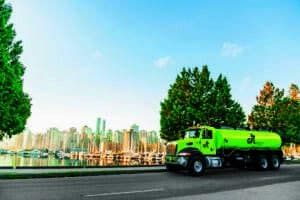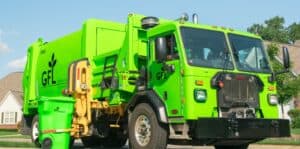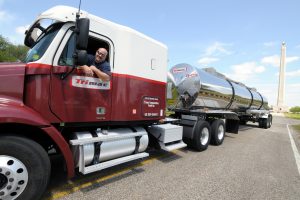GFL = Green for Life. It also means communicating safety consciousness.
Those big green garbage trucks you see in British Columbia municipalities are the customer-facing element of a successful and safety-conscious company providing an essential service.
GFL Environmental BC attained its Certificate of Recognition (COR) Achievement of Excellence Award (large employer) for 2023 on June 20, 2024. Getting the award is no small feat; it takes a lot of dedication and hard work to be recognized by SafetyDriven on behalf of WorkSafeBC for the commitment to exceeding basic regulatory safety requirements. GFL’s audit covered 17 of their 48 BC facilities, with interviews of nearly 10% of their 1500 employees.
GFL Environmental is seemingly ubiquitous; you see the green trucks everywhere. The company’s waste hauling trucks include roll-off, front-loads, manual side-loads, and the big trucks with compaction blades we see in our neighbourhoods every week. They also use heavy equipment and tank trucks.
GFL in British Columbia provides several types of service, including hauling residential and commercial solid waste; operating landfills, transfer stations, and recycling facilities; handling liquid waste; and soil remediation. Clearly, safety awareness must cover a wide range of operations.
Safety is all About Communication
Shauna-Rae Swanson, Regional EHS Manager, BC, is passionate about GFL’s work to maintain its safety culture. She is also on the Board of Directors of the Waste Management Association of BC; she is serious about the work of the waste management sector and committed to keeping its workers safe.
GFL in BC is large and growing; it went from 300 to 1500 people across the province in just two years. Expansion has come through acquisition. Each location is like a separate business, raising the bar on the challenges of creating a unified safety culture under the GFL banner; they call the program Safe for Life. How do you bring your safety attitude to so many people working at different jobs in more than 40 sites across the province?
The answer, according to Ms. Swanson, sounds relatively easy; communication. But she notes that communication is more than a simple conversation. It takes relationship-building to open dialogue and create a safe working environment. It requires buy-in and action at all levels. With minimal safety facilitators on the ground, each supervisor and manager is expected to oversee safety.
GFL’s Safe for Life program applies a safety framework that includes: proactive risk assessment; providing necessary resources; coaching and training; using technology; and assessing performance to enable constant improvement.
The company is invested in behaviour-based safety. Everyone is conscious of the need for safe workspaces—spaces that include truck cabs, offices, and conveyor belts at GFL’s recycling facilities. Safety education includes best practices for preventing trips, falls, and musculoskeletal injuries; using safety procedures like 3-point mounting/dismounting, equipment inspections, and safety talks; and protocols for handling hazardous waste. It also includes specific awareness, such as staying alert and avoiding distraction at a moving conveyor belt.
It’s natural for people to be resistant to change. But as Ms. Swanson says, “Change is the catalyst of growth.” Open two-way communication as the company has grown allows trust—and subsequently a solid safety culture—to grow. It is nurtured by a company-wide open-door policy—anyone can raise a safety concern, knowing their feedback will be heard and considered with an open mind.
Making it Work

Communication alone doesn’t create commitment to safety excellence. People need encouragement, coaching, and even a little fun.
GFL BC’s Employee Recognition program offers employees the chance to get their name on the “Stanley Cup,” aka a safety champion award. Recipients must have completed safety training, had no at-fault incidents, encouraged colleagues, and reported hazards. It comes with perks like premier parking. Response has been high, with people asking how to be recognized.
The PAUSE (Pause, Analyze, Understand, Secure, Execute) program provides an opportunity to conduct a last-minute hazard assessment, to stop and think about whether you’re about to do something safely. It suspends the train of thought for a moment.
Adopting technology in vehicles supports risk management and coaching opportunities. GFL has invested in on-board camera systems with enhanced driver alerts. Event recorders and telematics provide positive coaching moments and often protect drivers with recordings of vehicle accidents.
GFL added Life-Saving Rules in 2024, a simple but effective way to avoid complacency. It’s a list of 10 rules that remind people to work safely and includes the types of things you wouldn’t think require reminders—things you might do without thinking, like walking across the yard without looking for moving vehicles.
Team-building is important to a safety culture, because it levels the playing field. GFL activities like quarterly employee appreciation days and social events with the executive group reinforce the camaraderie that helps people look out for others.
At GFL Environmental, being Safe for Life reflects the company’s ongoing pledge to the health and safety of everyone involved in their service. That’s something to talk about.

 describes the company’s
describes the company’s  A mishap is an opportunity to learn. People watch out for each other. Drivers are integral to Trimac’s safety record as they take their safety culture on the road; they are mindful of their own and clients’ safety. Their empowerment within the company has helped them support clients when unsafe practices have gone unnoticed because a long-standing process was never questioned. The result has been risk reduction in their own and clients’ facilities.
A mishap is an opportunity to learn. People watch out for each other. Drivers are integral to Trimac’s safety record as they take their safety culture on the road; they are mindful of their own and clients’ safety. Their empowerment within the company has helped them support clients when unsafe practices have gone unnoticed because a long-standing process was never questioned. The result has been risk reduction in their own and clients’ facilities. They also support a women’s Youth Apprenticeship Program and have an active Diversity, Inclusion, Equity, and Belonging council that educates and engages teams on the issue. Their policies regarding women and a diverse workforce are particularly important today, given the commercial driver shortage.
They also support a women’s Youth Apprenticeship Program and have an active Diversity, Inclusion, Equity, and Belonging council that educates and engages teams on the issue. Their policies regarding women and a diverse workforce are particularly important today, given the commercial driver shortage.